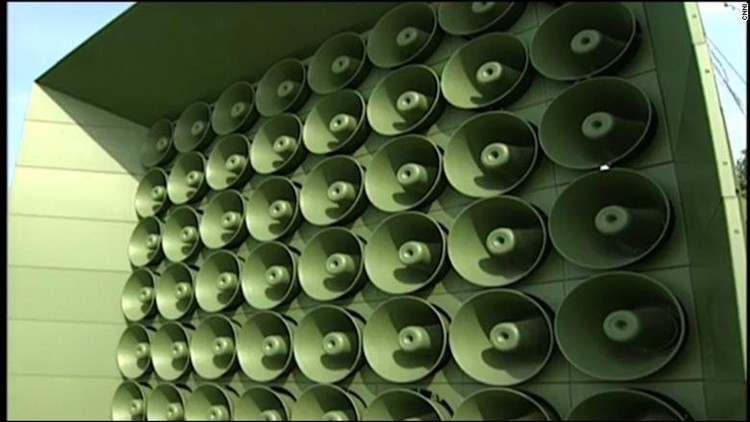South Korea’s military announced Monday it has turned off loudspeakers that blast propaganda across the highly militarized border with North Korea, in an apparent gesture of goodwill ahead of Friday’s historic summit between the two nations’ leaders.
The speakers, which can be heard for miles on the North’s side, have been playing on a regular basis since January 2016, when they were turned back on as a response to North Korea‘s fourth nuclear test. They broadcast Korean pop music, news and weather forecasts — snippets of everyday life in the South that are strictly off limits for North Koreans.
Though North Korea also engages in propaganda broadcasts of its own, it has long objected to the South’s use of speakers, and has at times responded to them with artillery fire.
The move represents a modest concession to Pyongyang just days before its leader, Kim Jong Un, is set to meet South Korean President Moon Jae-in during Friday’s inter-Korean summit.
It’s the first time the leaders of the two Koreas, which are technically still at war since the Korean War ended with a truce in 1953, will sit down for face-to-face talks in more than a decade.
A spokeswoman for South Korea’s Defense Ministry said the decision was made “to ease military tension between the two Koreas and to create a peaceful environment for the upcoming summit.”
Preparations for the meeting are now in full swing, with working-level talks between the two countries starting Monday to hammer out details. The US State Department’s point person for East Asian and Pacific affairs, Susan Thornton, is also in Seoul, where she is scheduled to meet with South Korean Foreign Minister Kang Kyung-wha.
Denuclearization a sticking point?
The summit itself, and a potential upcoming meeting between Kim and Trump, would have been unthinkable last year, when saber-rattling between Washington and Pyongyang combined with North Korea’s increased nuclear and ballistic weapons testing to raise tensions dramatically.
The topic of denuclearization is likely to be high on the summit agenda, but what exactly the term constitutes isn’t clear.
US President Donald Trump and his administration are expected to seek the complete, verifiable and irreversible dismantlement of Pyongyang’s nuclear program, a stated policy goal dating back to the Clinton administration.
Analysts have said that the North Koreans see denuclearization as a burden both parties must share. If the North were to give up its nuclear weapons, it could ask in return for the United States to remove its nuclear-capable assets from the region, and even remove South Korea from its nuclear umbrella — a commitment from the US to use its nuclear weapons in defense of allies.
Moon said Thursday the North Koreans have dropped its long-held demand that the United States withdraw forces from South Korea and that he believes both sides do not differ when it comes to “the concept of denuclearization.”
Moon: Bright future
On Saturday, Kim announced Pyongyang had succeeded in its effort to develop nuclear weapons capabilities and would no longer conduct the tests needed to perfect or improve its armaments.
Those tests, whether firing missiles or detonating nuclear weapons underground, are violations of international law and considered highly provocative actions within the international community.
Moon on Monday called the decision was a crucial step toward denuclearization.
“It is a green light that enhances the success of the North-South and NK-US summit,” the South Korean leader said, according to a statement released by his office Tuesday.
“If North Korea goes from a nuclear freeze to complete nuclear dismantlement, a bright future for North Korea can be guaranteed.”
A North Korea source told CNN that Kim has finally decided to open up a new chapter for his nation. Kim has committed himself to the path of denuclearization and will now focus solely on economic growth and improving the national economy, the source said.
The North Korean leader has realized the best path forward is to normalize relations with other countries, the source added. He is finally being recognized by the international community, and this is a historic, timely opportunity, the source said.
Though Kim’s statement appeared to mark a shift in tone, experts say the specifics of his policy pronouncements were vague enough to give him plenty of wiggle room if North Korea decided to resume weapons testing or development.
Kim’s declaration that he would shutter the country’s nuclear test sites Punggye-ri, also rang hollow to some analysts. North Korea’s September nuclear test caused a 6.3-magnitude tremor and was believed to have resulted in serious environmental impact, potentially damaging parts of the complex.
Those measures may not be enough to ease up on the crippling sanctions levied against Pyongyang as punishment for its nuclear and missile tests.
Trump, who has spearheaded the push to economically and diplomatically isolate North Korea, will reportedly ask Kim to dismantle the country’s nuclear arsenal without conceding significant ground on economic sanctions, The Wall Street Journal reported Sunday.
Iran: US not a reliable partner
Trump is taking a similar hard-line stance when it comes to the nuclear deal with Iran, which was negotiated under US President Barack Obama’s administration.
The current US President has threatened to pull out of the deal unless more is done to stop what he believes is Tehran’s destabilizing actions in the Middle East.
Iran’s Foreign Minister, Mohammad Javad Zarif, warned that Trump’s efforts to redo the Iran deal could stymie his efforts with North Korea.
“This is not a bilateral agreement between Iran and the United States and withdrawing from it would be seen by the international community as a an indication that the United States is not a reliable partner in the international community,” Zarif said in an interview with CBS News.
“This would be a very bad precedent if the United States sends this message to the international community that the length or the duration of any agreement would depend on the duration of the presidency.”



